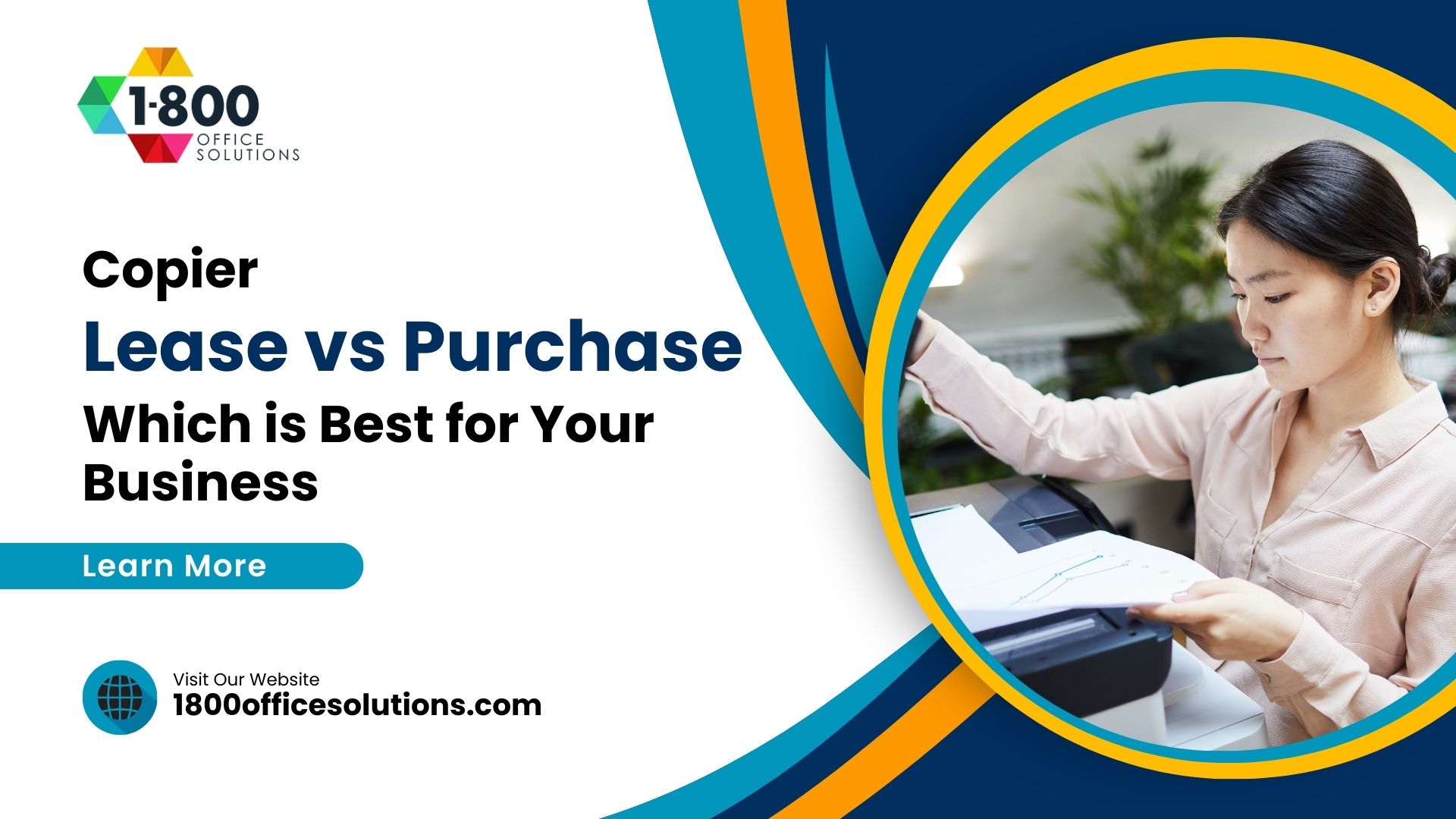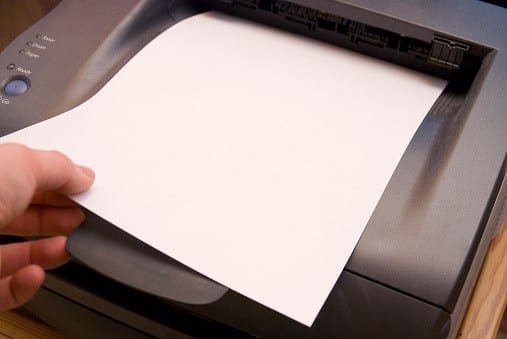Top 10 Things to Know Before Signing an Office Copier Lease
Introduction
In today’s fast-paced business environment, the need for efficient and reliable office equipment is paramount. Among the essential tools in any office are copiers and printers. Whether it’s a multifunction copier that can scan, print, and copy or a specialized commercial copier, these machines are integral to productivity.
Leasing a copier, rather than buying a copier outright, has become a popular solution for many companies. It allows businesses to access high-quality office equipment without the upfront cost. The decision to lease or buy a printer or copier can significantly impact cash flow, and it’s a decision that must be tailored to the business needs.
Understanding the terms of a office copier lease agreement is crucial. From the monthly cost to the type of copier, every detail matters. Choosing the right office equipment requires careful consideration of factors such as leasing rates, the lease period, and the specific needs of your business, such as color copier requirements or xerox versalink features. You can get free quote from 1800 Office Solutions, they provide you each and every details.
Top 10 Key Considerations Before Signing a Lease
Understanding the Entire Lease
- Importance of reading the entire document: An office copier lease agreement is a legally binding contract that outlines the terms and conditions of leasing a copier or multifunction copiers. It’s essential to read the entire document to understand what you’re agreeing to. This includes the cost per print, the lease period, and any associated terms like maintenance and support.
- Checking for contradictions and special terms: Sometimes, standard or boilerplate leases may contain contradictions or special terms that don’t align with what was negotiated. Ensuring that the lease accurately reflects the agreed-upon terms is vital to avoid misunderstandings or disputes later on. This includes checking for any hidden fees or conditions that may affect the overall cost to lease a copier.
Negotiating the Best Deal
- Opportunity for negotiation: Before signing an office copier lease agreement, there’s often room for negotiation. Whether it’s the monthly cost, the type of copier, or the lease period, understanding your business needs and negotiating terms that align with those needs is essential. This might include negotiating for specific printer technology or a particular brand like HP or Ricoh.
- Making a list of provisions for change: If there are terms in the lease that you’re uncomfortable with, make a list and discuss them with the leasing company. This could include negotiating a lower average cost, more favorable leasing rates, or specific provisions related to the end of the lease. Being clear about what you want can lead to a more favorable lease agreement.
Understanding CAM Terms
- Common area maintenance (CAM) fees: In commercial leases, CAM fees are common. These are costs associated with maintaining common areas in a commercial space. Understanding how these fees are calculated and what they include is crucial. This might involve negotiating terms to ensure the copier leasing company’s fees are fair and transparent.
- Negotiating CAM terms: CAM terms can be complex, and it’s essential to understand what you’re responsible for. This might include negotiating a cap on CAM fees or understanding how they are allocated. Understanding CAM Terms in Commercial Leases can provide insights into how to negotiate these terms effectively.
Responsibility for Capital Expenditures
- Understanding structural expenditures: Capital expenditures refer to significant structural costs, such as roof repairs or HVAC maintenance. In an office copier lease, understanding who is responsible for these costs is vital. It might affect the overall cost of leasing a copier and impact your business’s cash flow.
- Avoiding the burden of major repairs: Negotiating terms that clearly define the responsibility for major repairs can protect your business from unexpected costs. This might include limiting your responsibility for certain repairs or setting a maximum annual amount for maintenance costs. Ensuring clarity in this area can provide peace of mind and financial stability.
Lease Assignability and Sublessee Rights
- Understanding the right to assign or sublease: Lease assignability refers to the ability to transfer the lease to another party. Sublessee rights allow another business to share the leased space under your terms. Understanding these rights and negotiating them with the leasing company can provide flexibility and protect your interests.
- Negotiating terms with the landlord: If you plan to sell your business or share costs with a sublessee, negotiating these terms upfront is essential. This might include ensuring that the landlord cannot terminate the lease upon assignment or setting clear terms for subleasing. These negotiations can protect your business and provide options for future growth.
Personal Guarantee and Business Structure
- Understanding personal guarantee clauses: Many office copier leases require a personal guarantee, holding you personally responsible for the lease. Understanding this clause and negotiating its terms can protect your personal assets. This might include limiting the guarantee to a specific period or portion of the lease term.
- Ensuring proper corporate structure: Before signing a lease, ensure that your business structure is in place and properly documented. Whether it’s a corporation or an LLC, having the right structure can protect you legally and financially. This includes ensuring that the lease has been approved by your board of directors or other governing body.
To Own, Purchase, or Return?
- $1 Buyout Lease vs. FMV Lease: A $1 Buyout Lease allows you to purchase the copier for $1 at the end of the lease, turning it into an asset. An FMV (fair-market value) Lease gives the option to purchase or return the copier at the end of the term. Understanding the pros and cons of both options, such as interest rates and potential mechanical problems, is essential.
- Pros and cons of both options: The $1 Buyout Lease might have higher interest rates but allows you to own the copier outright. An FMV Lease might offer lower rates but requires maintenance and potential return costs. Weighing these options against your business needs, such as purchasing a new copier or leasing a printer, can guide your decision.
Auto-Renewals in Office Copier Lease Agreement
- Understanding automatic renewal terms: Many office copier leases include an automatic renewal clause. This means that if you don’t cancel the lease within a specified period, it may automatically renew for another term. Understanding this term and the associated deadlines is crucial to avoid unexpected renewals and additional costs.
- Importance of cancellation deadlines: Missing a cancellation deadline can lead to an unwanted renewal and additional costs. Being aware of these deadlines and setting reminders can prevent this. If needed, negotiating a more favorable cancellation period with the leasing company may be a better option, ensuring that the lease aligns with your business’s current copier leasing needs.
Additional Factors to Consider
Service and Maintenance Agreements
- Understanding service agreement inclusion: When leasing printers and copiers, it’s common for leasing companies to include service and maintenance agreements as part of the lease. This can be beneficial as it ensures the copier machine is regularly serviced and maintained. However, it’s essential to understand what is included in these agreements, such as the frequency of service, what parts are covered, and the average cost.
- Splitting lease and maintenance agreements: In some cases, it may be a better option to split the lease and maintenance agreements into separate contracts. This allows flexibility in choosing a different service provider if the current copier leasing company’s service is unsatisfactory. It also provides clarity in understanding the monthly cost for both the lease and maintenance, ensuring transparency and control over expenses.
Managed Print Solutions
- Understanding base rate vs. flat cost per print: Managed print solutions offer different pricing structures, such as a base rate that includes a certain number of prints per month or a flat cost per print. Understanding these options is crucial when choosing a copier or multifunction printer. A base rate might offer cost savings if your office printer usage is consistent, while a flat cost per print provides flexibility if usage varies.
- Discussing options before signing: Before signing a lease agreement, discuss the managed print solutions with the leasing company. Understanding how much does it cost for additional prints beyond the base rate, or negotiating a favorable flat cost per print, can align the lease with your business’s specific needs. This ensures that you choose the right equipment and pricing structure for your office technology needs.
Questions and Assumptions
- Asking questions and avoiding assumptions: Leasing a copier or printer involves many details, from the type of copier to the lease period. It’s essential to ask questions and clarify any uncertainties rather than making assumptions. Whether it’s understanding the upfront cost, the process of purchasing a copier at the end of the lease, or the specific benefits of leasing over buying, asking questions ensures clarity and alignment with your business needs.
- Understanding hidden costs: Hidden costs can quickly add up and affect the overall cost to lease a copier. This might include additional fees for color copier usage, leasing rates for specific features like Xerox Versalink, or costs associated with the end of the lease. Understanding and clarifying these costs upfront can prevent surprises and ensure that the lease agreement aligns with your budget.
Local Regulations and Legal Considerations
- Complying with local laws and regulations: Different jurisdictions may have specific laws and regulations related to leasing commercial printers and copiers. Complying with these laws is essential to avoid legal issues. This might include understanding local tax implications, environmental regulations related to copier and printing equipment, or specific consumer protection laws.
- Seeking legal advice if necessary: If the lease agreement is complex or if there are uncertainties about local regulations, seeking legal advice may be a wise option. A legal professional can review the lease, ensure compliance with local laws, and negotiate terms that protect your interests. This investment can provide peace of mind and prevent potential legal challenges down the road.
Choosing the Right Vendor
- Researching and selecting a reliable vendor: Choosing the right vendor for leasing an office copier or multifunction printer is a critical decision. Researching vendors, understanding their reputation, the quality of their office equipment, and their commitment to exceptional service can guide your choice. Whether it’s a Canon imageRUNNER for small offices or a Xerox AltaLink for a new office, selecting a vendor that aligns with your needs ensures a positive leasing experience.
- Understanding support levels and flexibility: Different vendors offer varying levels of support and flexibility. Understanding these aspects is essential when choosing a copier or deciding to lease rather than buy. This includes understanding the vendor’s response time for service calls, the flexibility in changing or upgrading equipment, and the options for purchasing a copier outright or leasing and buying at the end of the lease. A vendor that offers flexibility and strong support can be a valuable partner in meeting your business’s copier and printing needs.
What People Also Ask
What are the common types of copier leases?
There are several common types of copier leases, including Fair Market Value (FMV) leases and $1 Buyout leases. FMV leases allow you to return or purchase the equipment at the end of the lease at its fair market value. $1 Buyout leases enable you to buy the copier for $1 at the end of the lease. Understanding these options and how they align with your business may help you choose the right lease.
How can I negotiate the best deal on a copier lease?
Negotiating the best deal on an office copier lease involves understanding your business needs, researching vendors, and being clear about what you want. This might include negotiating the monthly lease cost, the type of copier, or specific terms like maintenance agreements. Being informed and willing to negotiate can lead to a lease that aligns with your business needs and budget.
What are CAM terms, and how do they affect my lease?
CAM (Common Area Maintenance) terms refer to the costs associated with maintaining common areas in a commercial space where the copier is housed. Understanding these terms and how they are calculated is essential. It might affect the overall cost of the lease and requires careful consideration and potential negotiation to ensure fairness and transparency.
What should I know about auto-renewals in a copier lease agreement?
Auto-renewals in an office copier lease agreement refer to the automatic renewal of the lease if not canceled within a specified period. Understanding this term and the associated deadlines is crucial to avoid unexpected renewals and costs. Being aware of these deadlines and potentially negotiating a more favorable cancellation period can prevent unwanted surprises.
How can I avoid hidden costs in a copier lease?
Avoiding hidden costs in an office copier lease involves understanding all the terms and costs associated with the lease. This includes asking questions, clarifying uncertainties, and ensuring that all costs are transparent and agreed upon. Understanding potential hidden costs, such as additional fees for specific features or costs at the end of the lease, can prevent surprises and ensure alignment with your budget.
Conclusion
Leasing a copier or multifunction printer is a complex decision that requires careful consideration of many factors. From understanding the different types of leases to negotiating favorable terms, every detail matters. Complying with local regulations, choosing the right vendor, and being aware of potential hidden costs are all part of the process.
The decision to lease an office copier or buy printers must align with your business’s specific needs, budget, and long-term goals. Considering before leasing a copier and seeking professional guidance if needed can ensure that you make an informed decision that supports your business’s productivity and growth.
Whether it’s a solution for your small office or a comprehensive print solution for a new office, the right lease can provide peace of mind and a dependable solution for your business, depending on your business needs and goals.












